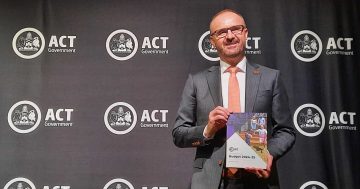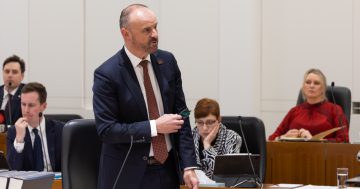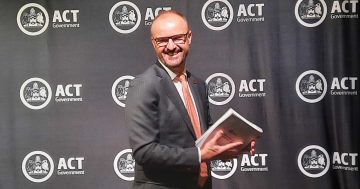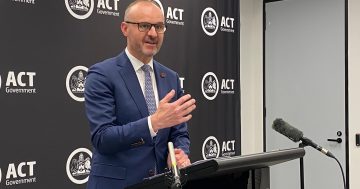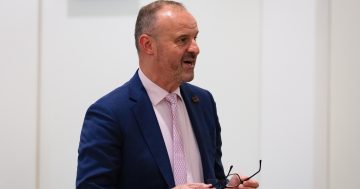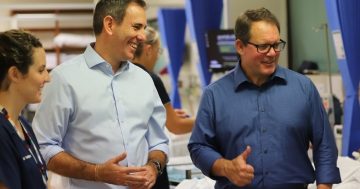
The Chief Minister shares a few thoughts about the ACT economy with The RiotACT.
The ACT Government is to exploit a much-improved Budget position, thanks to higher GST receipts and land sales, to continue investing in infrastructure and services to meet Canberra’s growing needs, but there will be no immediate relief for ratepayers.
Chief Minister and Treasurer Andrew Barr told The RiotACT that while the rate of increase in the tax reform package will continue to decline over the forward estimates and there was the potential for deeper stamp duty cuts, he was not in the business of offering tokenistic tax cuts.
“Noting the growing population and infrastructure needs Canberra has, we will need to continue to invest in that infrastructure in order to maintain livability and quality of life,” he said. “Given the choice between a tokenistic tax cut and investment in health and education and transport infrastructure, research has shown consistently, even more so in Canberra, people favour Government making that collective investment.”
He remained committed to the principle of replacing stamp duty and replacing it with a broad-based land tax, which was the simplest, fairest, and most efficient form of tax revenue.
“Anything we do will be targeted to achieve another economic or social outcome,” he said.
But he did offer hope to those who may be in work but struggling to make ends meet and battling high housing costs.
“There is one group of Canberrans whose income fall above the threshold to get a range of concessions and support. Those people have not had a significant wage increase for some time and many have had penalty rate cuts. We are certainly looking through the measures that we have to see how we can assist that group,” Mr Barr said.
He said facilitating more community housing options was a practical example of where the Government could make a difference and foreshadowed measures in the budget.
“We already have a significant concessional loan to undertake community housing in Canberra. There will be new opportunities in suburban land release and in infill sites to proceed more community housing builds,” he said.
Opposition Leader Alistair Coe said the improved position was due to a $60 million windfall in GST revenue and the Government would borrow $500 million this year to finance its spending.
He said it needed to keep reining in costs and not keep hiking rates and fees that were pushing people across the border.
“Given the amount of taxation that is happening in the ACT the Government should be getting surpluses,” he said.
But Mr Coe would not say whether the Canberrra Liberals would reduce property rates if in office.
In his Budget Review, Mr Barr said that after a tough few years, the ACT’s economy is now powering ahead.
The deficit has been halved to $41.5 million, compared with the $83.4 million deficit forecast at the time of the Budget, and the Budget Review projects strengthening surpluses across the forward estimates, with a net surplus of $89.4 million over four years.
Mr Barr highlights light rail, public housing, hospital waiting lists, the ambulance service, schools, courts and public safety as areas for further spending.
“Last year over 10,000 new jobs were created in Canberra: the strongest year of job creation in a decade. Over 80 per cent of those new jobs were full time – giving Canberra families
the stability and security they need,” he said. “Importantly too, the new jobs emerging in our economy have been in a diverse range of sectors from education and healthcare to tourism,
retail and professional services, creating opportunities for Canberrans from all backgrounds.”
The ACT’s Gross State Product grew by 4.6 per cent (real terms) in 2016-17, up from 3.9 per cent in 2015-16, the highest growth rate for any state or territory, and significantly exceeded Australia’s 2 per cent growth in Gross Domestic Product during 2016-17.
The economy is forecast to continue growing strongly throughout 2017-18 at 4 per cent, before a moderation to 31.4 per cent growth in 2018-19 and a return to trend growth thereafter. Growth in real Gross State Product per capita in the ACT was 2.9 per cent in 2016-17, the second highest in the country and again significantly exceeding Australia’s 0.4 per cent average growth.
Mr Barr said the ACT’s $3 billion infrastructure program included the $608 million Public Housing Renewal program, with 661 new properties already delivered and around 420 additional properties expected to be completed by the end of 2018.
“A strengthening budget position creates room for more investment in Canberra’s frontline services, and that is what the Government is delivering through this Budget Review,” he said.
“We will deliver more surgeries – including elective surgeries – this year, cutting waiting times to get more Canberrans back to health sooner. We are delivering on our election commitment to recruit a full new ambulance crew, while also hiring more paramedics to help meet demand pressures across the ACT Ambulance Service. We are rolling out laptops to all Canberra public secondary students ahead of schedule to ensure they have the right tools to thrive at school. And we are investing more in our courts and community safety to make sure the justice system continues to deal with crime effectively and efficiently, while respecting people’s rights.
Mr Barr said the Government’s budget strategy remained focused on:
• strengthening and diversifying the ACT economy, with an emphasis on the creation of good jobs and the delivery of high-quality services to Canberrans;
• maintaining a strong operating balance over the medium term; and
• investing in infrastructure projects that will protect Canberra’s liveability and boost our productivity as the city grows.













